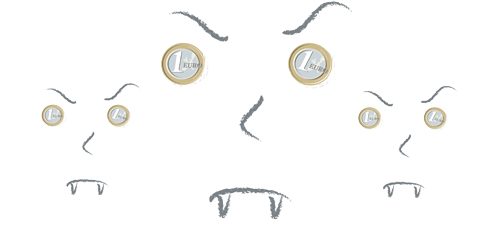Peter Gauweiler has never liked the euro. “Esperanto money” he calls it, playing on the language created by an optimistic Jewish opthamologist in Czarist Russia to help foster a spirit of international harmony among different peoples. “If you want to help Greece and Portugal, then you have to say: get out of the Eurozone”, the CSU politician remarked this week in a round-table discussion. Accusations of populism he shrugs off easily: “It just means that I know what the people are thinking.”
Gauweiler may not know what “the people” think. But he does know what more and more Europeans want: to dump the euro. Across Europe, the enduring crisis, cost-cutting and bail-outs are increasing the distaste for the single currency. In France the right-wing National Front is railing against the euro, while in the Netherlands the populists of the PVV (Party for Freedom) want the guilder back.
And in Finland the “True Finns” party with their anti-euro rhetoric took third place in the parliamentary elections. The worries are hitting the financial markets now too: “The economic risk in the monetary union is being overtaken by the political risk,” believes Thomas Mayer, chief economist of Deutsche Bank.
For despite financial aid and a tougher stability pact, the euro crisis is not yet over. Peripheral countries are seeing massive cutbacks in social spending. Increasing taxes, falling wages, shrinking pensions – the state is receding further and further into the background, and the people are getting poorer. Many lay the blame on the EU or the International Monetary Fund. Anger is growing.
Tough conditions
At the same time, one thing is clear: Portugal, Spain, Ireland and Greece will have to cut back and save much harder than previously thought. For the tough conditions imposed can send economic growth into a nosedive, taking down tax revenues with it. And despite the austerity measures the deficit is climbing.
“The consolidation program for Greece for 2011 is on the brink of failure,” fears Commerzbank economist Christoph Weil. The budgetary situation in Spain and Ireland has seen no improvement in the early months of this year. Portugal will have to resolve on further consolidation.
Since all the countries in crisis rely on exports as their growth engine, they will try to boost their competitiveness with countries like Germany by bringing in wage cuts. That pushes down income, which in turn saps consumption. An “austerity overload” is looming over the horizon, warns the French bank Société Générale. “And that’s a risky game to play.”
Anti-euro sentiment is simmering in the countries hit by the crisis. “Euro-skepticism is a political force that is waiting for its breakthrough in Ireland,” warns Hugo Brady of the Centre for European Reform.
Even in the richer countries like Finland, Germany and the Netherlands, however, discontent is growing among the peoples who see themselves as the paymasters of Europe. “Long-term financial assistance to cash-strapped governments will lead to political tensions” predicts Deutsche Bank’s Chief Economist Mayer.
“Like a lightning rod in a storm”
Right-wing parties are taking advantage of the situation. And so the “True Finns” have declared that they will vote against all assistance to Portugal. The huge increase in votes for the party could therefore turn out to be a serious problem for the EU. A Euro-sceptic Finnish government could block all EU decisions that require unanimity.
In France as well, the National Front has won great success with anti-European slogans. “The EU is a structure that for me has totalitarian features,” said National Front leader Marine Le Pen. “A European Soviet Union, so to speak.”
Addressing the Dutch parliament, PVV leader Geert Wilders inveighed against financial aid for stricken Greece: “For us hard work, for them souvlaki. We plod, and they reach for the ouzo. But the PVV says: not a euro-penny for Greece! Just as little for the Portuguese and the Spaniards!”
Heard till now only on the political margins, these creeds are starting to unsettle the financial markets. “The economic climate is getting worse, and that always bears fruit for the far-right ideology,” writes Dylan Grice of the Société Générale in a study for investors.
Traditionally the right is unwelcoming to outsiders – foreigners and immigrants, mostly. In the supra-national currency, the euro, it seems to have found a new scapegoat. “Every single euro-member country sees itself as being under the thumb of foreign masters,” writes Grice. “And the euro stands solitary in the landscape, like a lightning rod in a storm."
Was this article useful? If so we are delighted!
It is freely available because we believe that the right to free and independent information is essential for democracy. But this right is not guaranteed forever, and independence comes at a cost. We need your support in order to continue publishing independent, multilingual news for all Europeans.
Discover our subscription offers and their exclusive benefits and become a member of our community now!












